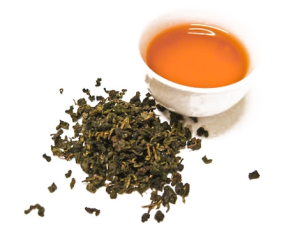Contents
Uses
- Oolong (also Wulong) tea is a product made from the leaves, buds, and stems of the Camellia sinensis plant. This is the same plant that is also used to make black tea and green tea. The difference is in the processing. Oolong tea is partially fermented, black tea is fully fermented, and green tea is unfermented.
- Oolong tea is used to sharpen thinking skills and improve mental alertness. It is also used to prevent cancer, tooth decay, osteoporosis, and heart disease.
- Some people use oolong tea to treat obesity, diabetes, “hardening of the arteries” (atherosclerosis), high cholesterol and skin allergies such as eczema; and to boost the immune system.
- Oolong tea contains caffeine. Caffeine works by stimulating the central nervous system (CNS), heart, and muscles. Oolong tea also contains theophylline and theobromine, which are chemicals similar to caffeine.
Benefits
- Mental alertness. Drinking oolong tea or other caffeinated beverages throughout the day seems to maintain alertness and mental performance. Combining caffeine with sugar as an “energy drink” seems to improve mental performance better than either caffeine or sugar alone.
- Women who regularly drink tea, including black tea, green tea, or oolong tea, appear to have a significantly lower risk of developing ovarian cancer. One study found that drinking 2 or more cups of tea daily seems to cut ovarian cancer risk by almost half.
- Treating skin allergies (eczema). Developing research suggests that drinking about 4 cups (34 oz or 1000 mL) of oolong tea per day in 3 divided doses improves eczema that hasn’t responded to other treatments. It may take 1 or 2 weeks of treatment to see improvement.
- Treating diabetes. Some research suggests that drinking about 6 cups (50 oz or 1500 mL) of oolong tea for 30 days might lower blood sugar in people with type 2 diabetes. However, tea drinking doesn’t seem to prevent diabetes.
- Preventing high blood pressure. Some research in Chinese people shows that drinking 1 or 2 cups (4-20 oz or 120-599 mL) of oolong tea or green tea daily seems to prevent high blood pressure. Drinking more tea seems to lower the risk even more.
- Weak bones (osteoporosis). There is some evidence that drinking oolong tea for 10 years is associated with stronger bones (increased bone mineral density).
- Promoting weight loss.
- Preventing tooth decay.
- Reducing the risk of cancer.
- Other conditions.
Cautions
- Too much oolong tea, more than five cups per day, can cause side effects because of the caffeine. These side effects can range from mild to serious and include headache, nervousness, sleep problems, vomiting, diarrhea, irritability, irregular heartbeat, tremor, heartburn, dizziness, ringing in the ears, convulsions, and confusion.
- If you are pregnant or breast-feeding, oolong tea in small amounts is probably not harmful. However, do not drink more than 2 cups a day of oolong tea. That amount of tea contains about 200 mg of caffeine. Too much caffeine during pregnancy might cause premature delivery, low birth weight, and harm to the baby. Too much caffeine during breast-feeding might cause irritability and increase bowel movements in nursing infants.
Interactions
Moderate Interaction Be cautious with this combination
- Amphetamines interacts with OOLONG TEA – Stimulant drugs such as amphetamines speed up the nervous system. By speeding up the nervous system, stimulant medications can make you feel jittery and increase your heart rate. The caffeine in oolong tea might also speed up the nervous system. Taking oolong tea along with stimulant drugs might cause serious problems including increased heart rate and high blood pressure. Avoid taking stimulant drugs along with oolong tea.
- Cocaine interacts with OOLONG TEA – Stimulant drugs such as cocaine speed up the nervous system. By speeding up the nervous system, stimulant medications can make you feel jittery and increase your heart rate. The caffeine in oolong tea might also speed up the nervous system. Taking oolong tea along with stimulant drugs might cause serious problems including increased heart rate and high blood pressure. Avoid taking stimulant drugs along with oolong tea.
- Ephedrine interacts with OOLONG TEA – Stimulant drugs speed up the nervous system. Caffeine (contained in oolong tea) and ephedrine are both stimulant drugs. Taking caffeine along with ephedrine might cause too much stimulation and sometimes serious side effects and heart problems. Do not take caffeine-containing products and ephedrine at the same time.
Other Names
Brown Tea, Camélia Chinois, Camellia sinensis, Camellia thea, Camellia theifera, Dragon Noir, EGCG, Epigallo Catechin Gallate, Epigallocatechin Gallate, Épigallocatéchine Gallate, Té Oolong, Tea, Tea Oolong, Thé Oolong, Thea bohea, Thea sinensis, Thea viridis, Theaflavin, Théaflavine, Wu Long, Wulong, Wu Long Tea, Wu-Long Tea, Wu Yi, Wuyi, Wuyi Oolong, Wuyi Tea, Wu Yi Wulong Tea.
References
Source: WebMD, http://www.webmd.com/vitamins-supplements/ingredientmono-1099-oolong%20tea.aspx?activeingredientid=1099&activeingredientname=oolong%20tea

